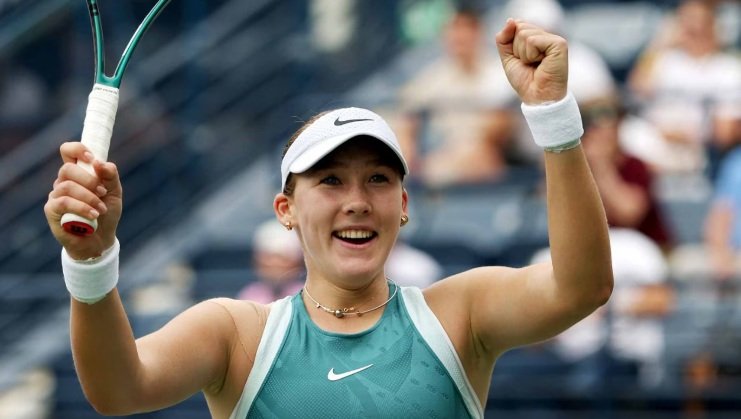Mirra Andreeva
Mirra Andreeva was born in Krasnoyarsk and from an early age made tennis the center of her development. Her technical progress advanced with precision under a family environment focused on high performance. By the age of 15, she was already competing solidly in WTA tournaments, showing unusual tactical maturity. Her passion extends beyond the game: she structures her entire life around the sport with discipline, analysis, and a clear vision of sustained effort.

Origin of an early determination
Born in the Siberian city of Krasnoyarsk, Mirra Andreeva found a structured sense of purpose within the lines of a tennis court from a very young age. Trained alongside her older sister Erika, also a professional player, she grew up in a disciplined environment where sport was not a pastime but a way of understanding the world. In a country with a strong tennis tradition, her first rackets were not toys but tools for rigorous preparation. Her move to Cannes to refine her technique at Jean-René Lisnard’s prestigious academy was not a coincidence: it was a strategic decision by her family to ensure high-level competitive development.
By the age of ten, she was already participating in tournaments that required a level of focus and composure well above the average. Her progress was not only accelerated but also methodical. Mirra absorbed playing patterns and refined every technical detail with the precision of reading a musical score. This ability to process and execute under pressure became a consistent trait, and from her early ITF matches, she was recognized as a player with deep understanding of game tempo.
Transition to professionalism with tactical maturity
When she entered WTA tournaments in 2023 at just 15, the impact was immediate. Her performance at the Mutua Madrid Open, where she reached the round of 16 defeating Top 50 players, showed not only talent but a strategically built game. Every shot she makes seems guided not just by physical intent but by a carefully calculated technical plan. What sets her apart from other young prospects is her ability to read opponents and adjust patterns during the match. Rather than showing youthful nervousness, she builds points with maturity, changing height and pace to destabilize more experienced players.
This tactical focus has allowed her to compete effectively on all surfaces, with a style that combines baseline power with surprising mental steadiness. Her court demeanor—calm, with minimal gestures or signs of frustration—has been compared to that of players with more than a decade on tour. That composure reflects a highly developed mental preparation, the result of both technical support and a personal disposition geared toward control and emotional endurance.
The influence of passion on her environment and personal development
Beyond statistics, Mirra’s passion for tennis has shaped her life off the court. Her daily routine revolves around training sessions, video analysis, physical preparation, and recovery blocks, requiring extremely precise time management. She has limited her exposure to social media and avoids media distraction to focus on a career she sees as both a personal and professional responsibility. This way of living the sport as a life project—not just a career—has influenced those closest to her. Her sister Erika, who shares part of the coaching team, sees in her a model of commitment that raises the family’s competitive standards.
The intensity with which she approaches tennis has not prevented her from developing a critical perspective on the circuit. In interviews, she has spoken about the demands of the calendar and the need to maintain mental health in high-pressure environments. Far from repeating common narratives, her voice is beginning to emerge on issues affecting young athletes, particularly the transition from adolescence to a professional world marked by performance pressure and public exposure.
Mirra Andreeva is not defined by media projection but by a record of verifiable on-court results. Every win is followed by analysis and improvement, and every loss by an objective review of errors. This logic, based on constant learning, is the driving force behind her career. In her case, passion is not a fleeting emotion but a complete system of thought and action that structures her life from the foundation to the elite level.
